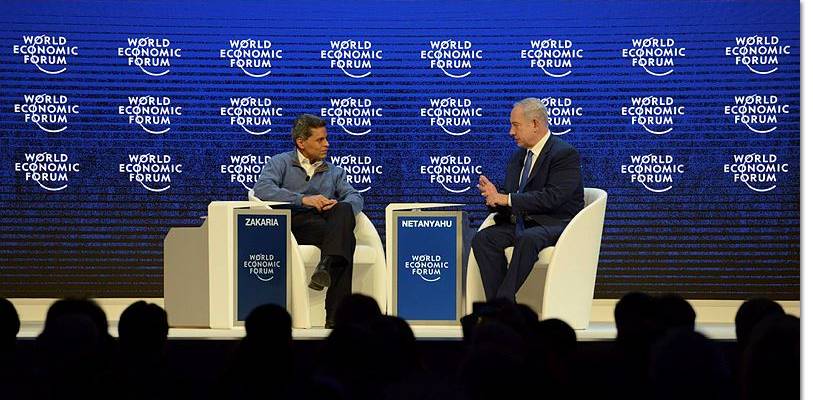Regarding the many challenges facing Israel, the Middle East and the West – primarily Iran and ISIS – Netanyahu stated: “My first responsibility is to ensure the safety and security of the one and only Jewish state.”
Interviewed Thursday by CNN journalist Fareed Zakaria at the annual World Economic Forum event in Davos, Switzerland, Israeli Prime Minister Benjamin Netanyahu said he wishes he were mistaken in fearing the outcome of the Iran nuclear deal and removal of sanctions against the Islamic Republic.
The UN’s “International Atomic Energy Agency now says that Iran has destroyed 98% of its enriched uranium,” Zakaria said, asking the Israeli leader why he isn’t encouraged by that fact.
“We always wanted this result,” Netanyahu said, “but we wanted something else: We wanted to make sure that Iran doesn’t reconstitute a much larger capability to enrich uranium with 200,000 centrifuges, which they’ll be free to do after 15 years. So the issue was never what happens now; the issue is how to prevent later Iran breaking to the bomb…
“The concern that I have…is that after a period of time, Iran could resume on a much larger scale its military program because there is no connection to the lifting of sanctions or the lifting of restrictions on Iran’s nuclear program to Iran’s behavior. It can continue to send its terrorists and its covert armies and overt armies throughout the Middle East, and would have the freedom to enrich as much uranium as it wants, which is the critical component for bombs.”
‘Not Sure I’ll Be Proven Wrong’ About Iran
“I hope that I’ll be proven wrong. I’ll be the happiest person,” he said. However, “I’m not sure that I’ll be proven wrong and I have my doubts, and we shall see very soon.”
Now that the deal is done, there are three imperatives, he continued, noting that Israel and the US are in agreement on this issue. First, Iranian activity must be monitored, and any violations of the nuclear agreement must get an appropriate response, such as sanctions.
Second, Iranian “aggression in the region” must be curtailed, and the way to do it is “to bolster America’s allies, first and foremost which is Israel. So we’re negotiating now with the United States, I’m negotiating with President Obama, a Memorandum of Understanding to support Israel’s security for the next decade.”
Third, looking beyond the region, it is necessary “to begin to dismantle the global terror network that Iran, and through its henchmen Hezbollah, is establishing in the Eastern Hemisphere and in the Western Hemisphere. I think that’s a common agenda that is actually very good for virtually all the countries in the world, and I think it should unite us on a purposeful plan of action.”
‘Rock-Solid US-Israeli Cooperation’
While stressing the “strong, powerful” and “rock-solid” US-Israeli cooperation, notwithstanding occasional disagreements, which are always “publicized” and “very dramatic,” Netanyahu discussed the military-support package under discussion. As it stands now, “in terms of protecting Israel, and by extension protecting our part of the region, the American assistance to Israel is about 3.1 billion dollars a year. We’re talking about a bigger package, but remember that even over a 10-year period, it pales in comparison to the enormous funds that Iran gets.”
Zakaria repeated the Iranian foreign minister’s rhetorical question: “How can Israel, which has nuclear weapons, sit in judgement over Iran, which does not?”
The profound difference, Netanyahu replied, is that “Israel doesn’t seek to destroy anyone,” while “Iranian leaders are talking about their goal to eradicate Israel off the face of the earth, to annihilate the six million Jews of Israel while denying the Holocaust that murdered another six million.”
Regarding the civil war in Syria, Israel has two main concerns, the Israeli leader said. “We don’t want ISIS to win, and we don’t want Iran to have a Syrian dominion from which it can operate.”
‘Israel is Sought After’
Asked whether he fears boycotts and delegitimization of Israel, Netanyahu stated, “Israel is sought after… A leader from one of the big business organizations said to me, ‘Boycott Israel? How can I boycott Israel?’ He has a very big R&D operation in Israel. He said, ‘If I boycott Israel, I’ll boycott myself.’
“So I think that is telling you that on the state level and on the business level, Israel has become a very interesting country for governments and businesses alike, and I think that reality is changing. And the most dramatic change, without a doubt, is the relationship that is beginning to develop between Israel and most of our Arab neighbors in order to fashion a Middle East free of the dominance of militant Islam.”
Netanyahu cited Palestinian Authority President Mahmoud Abbas’s consistent refusal to reenter negotiations with Israel, despite Israel’s willingness.
The Israeli prime minister also acknowledged the warming of relations with Saudi Arabia and other Sunni Arab states due to the common threats of Iran and ISIS.
“My first responsibility is to ensure the safety and security of the one and only Jewish state,” Netanyahu declared.
(To read the full transcript and see the interview, click HERE.)
By: United with Israel Staff
Do You Love Israel? Make a Donation - Show Your Support!
Donate to vital charities that help protect Israeli citizens and inspire millions around the world to support Israel too!
Now more than ever, Israel needs your help to fight and win the war -- including on the battlefield of public opinion.
Antisemitism, anti-Israel bias and boycotts are out of control. Israel's enemies are inciting terror and violence against innocent Israelis and Jews around the world. Help us fight back!



